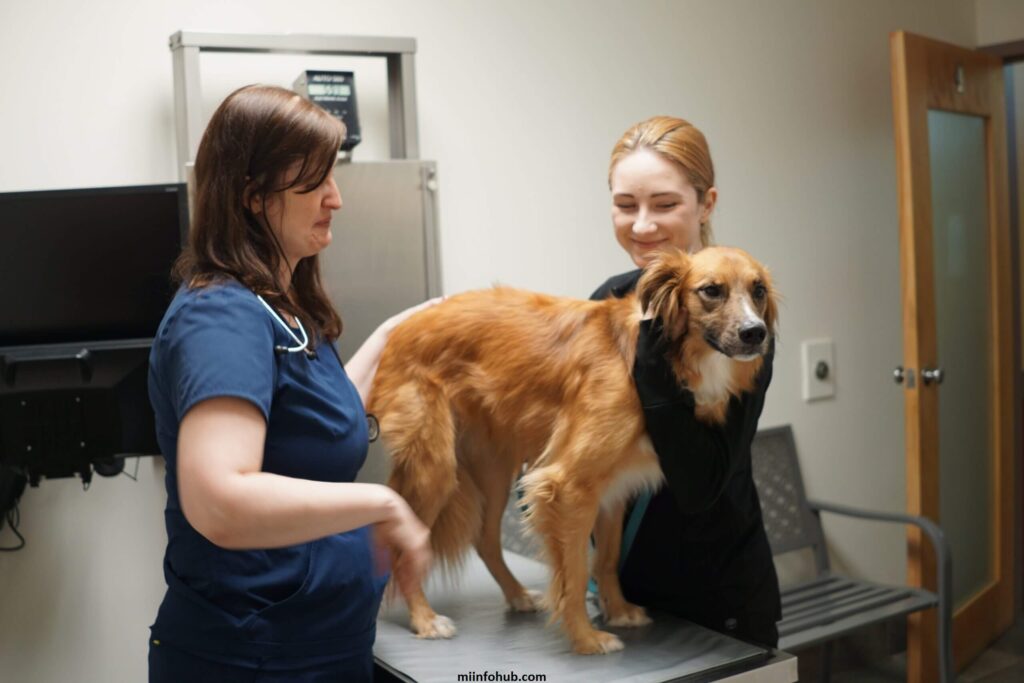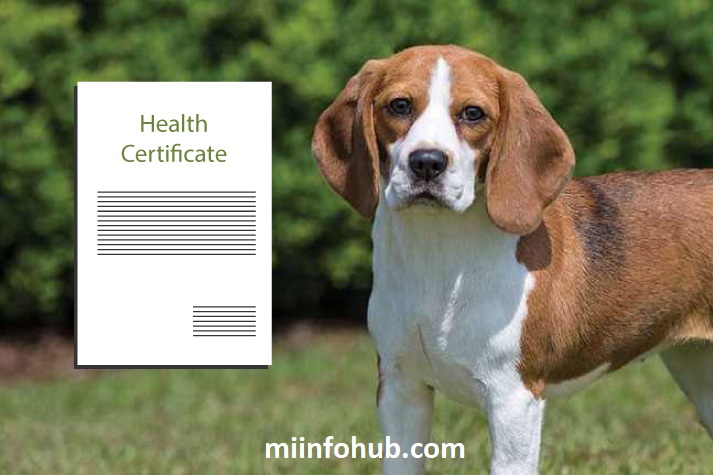A health certificate for dogs is an official document issued by a licensed veterinarian. It confirms that a dog is in good health, up-to-date on vaccinations, and free from contagious diseases. Travel, boarding, or certain activities often require this certificate.

Why Health Certificates Are Important For Dogs
Health certificates protect the health and safety of pets, owners, and the public. They help prevent the spread of infectious diseases, verify vaccination status, and ensure a dog meets the necessary health standards for travel or group activities.
Types Of Health Certificates For Dogs
- Domestic Health Certificates
Required for travel within a country, often when moving between states or regions. It confirms that the dog is healthy and safe to travel, posing no risk to other animals or humans. - International Health Certificates
Required for traveling outside the country. This certificate must meet the destination country’s specific health regulations, which may include additional vaccinations or tests. - Rabies Certificate
Rabies vaccination proof is frequently required alongside a health certificate, particularly for international travel.
When You Need A Health Certificate For Dogs
Travel
- Airlines and many countries require a health certificate for pets to board. It’s crucial to check both airline and destination country regulations well in advance.
Boarding or Daycare
- Many boarding facilities and doggy daycares require proof of health to prevent the spread of illnesses.
Dog Shows and Competitions
- Competitions often require health certificates to ensure all animals are in good health and free of contagious conditions.

How Far In Advance Should You Get A Health Certificate
- Domestic Travel: For travel within a country, most health certificates are valid for up to 30 days. It’s ideal to have the certificate issued within this timeframe to avoid last-minute issues.
- International Travel: Many countries require the certificate to be issued within 10 days of arrival. International regulations are often stricter, and additional tests may be required, so plan at least a few weeks in advance to complete any necessary procedures.
- Boarding and Events: Some boarding facilities, daycares, and competitions may have their own specific requirements for timing. Typically, they follow a similar 10- to 30-day validity period, but it’s always best to confirm.
- Consult the Airline or Destination: Each airline and country may have specific timelines and additional requirements, such as rabies certificates or parasite treatments. Checking their regulations well in advance helps ensure you meet all guidelines.
What Health Certificate For Dogs Include
- Owner and Dog Details: Includes name, breed, age, and identifying characteristics.
- Vaccination Records: Proof of core vaccinations like rabies, parvovirus, and distemper.
- Examination Findings: Confirmation that the dog is free from visible signs of illness.
- Vet Certification: Signed by a licensed veterinarian after examination.
How To Get A Health Certificate For Dogs
- Schedule a Vet Appointment
Contact your veterinarian and inform them about the purpose of the certificate. Mention specific requirements if traveling abroad, as it may involve additional tests or vaccinations. - Complete Necessary Tests
Some destinations require tests for certain diseases, like heartworm or tapeworm. Your vet can guide you on any extra requirements based on your travel plans. - Certification by an Accredited Veterinarian
Make sure your vet is accredited by the USDA (for U.S.-issued certificates) to issue international health certificates. For domestic certificates, any licensed veterinarian can usually provide them.

Cost Of A Health Certificate For Dogs
The cost varies depending on the vet clinic and any additional tests required. In the U.S., prices may range from $50 to over $200. International certificates and additional vaccinations or testing can increase the cost.
How Long A Health Certificate For Dogs Is Valid
Most health certificates are valid for a specific period, usually 10 to 30 days. It’s important to complete the travel within this period to avoid issues. For international travel, some countries may require the certificate to be issued within a specific timeframe, often 10 days before departure.
Renewal And Updating Of Health Certificates
- Domestic Health Certificates: Valid for 10 to 30 days. If expired before travel, a new exam and certificate are needed.
- International Health Certificates: Often require certification within 10 days of travel. Delays may require an updated certificate.
- Vaccination Updates: New vaccinations must be included. Expired vaccinations may require updated records.
- Health Issues: Any health concerns or treatments may necessitate an updated certificate.
- Changes in Regulations: Stay informed about destination country rules, as they may require a new certificate.

Common Vaccinations And Health Checks Included
A standard health certificate often includes:
- Rabies Vaccination: Usually mandatory for travel and public activities.
- Distemper, Parvovirus, and Hepatitis Vaccines: Protects dogs from common, highly contagious diseases.
- Physical Exam: Ensures the dog is free from visible symptoms of illness.
- Parasite Control: Some countries require proof that the dog is free from parasites, such as ticks or worms.
Legal Requirements For Health Certificates
Health certificate regulations vary based on location and purpose. For instance:
- Domestic Travel: Some states require a certificate within 10 days of travel to verify the dog’s health.
- International Travel: Many countries have specific vaccine and testing requirements for incoming pets. For U.S. travelers, USDA endorsement is often necessary for international health certificates.
- Airline Requirements: Airlines may have unique health and documentation standards for pets, so it’s essential to consult each airline’s policy.
What To Expect At The Vet’s Office
During your visit for a health certificate, expect:
- Physical Examination: Your vet will check your dog’s eyes, ears, and overall condition.
- Vaccination Updates: If any required vaccinations are missing, they may be administered.
- Blood Tests or Parasite Checks: Required for some destinations, especially international travel.

Additional Health Tests For Certain Destinations
- Parasite Testing: Some countries require tapeworm or heartworm tests.
- Rabies Titers: A blood test to check rabies antibody levels may be required, especially in regions like Europe.
- Brucellosis Testing: Common for travel to the Middle East and Africa.
- Leptospirosis Testing: Required for tropical or subtropical regions.
- Heartworm Testing: Needed for some European countries.
- Tick-Borne Disease Testing: Some regions require tests for diseases like Ehrlichiosis.
- Microchip: Many countries require a microchip for identification.
- Health History: Some destinations may ask for proof of specific treatments or vaccinations.
Health Certificate For Dogs (Puppies And Senior Dogs)
Puppies need health certificates confirming they are up-to-date on vaccinations. They may require multiple vet visits to complete vaccination series.
Senior dogs may need more thorough health checks, including assessments for age-related conditions like arthritis or heart disease. Additional tests may be required depending on their health. Always consult with your vet to ensure they meet health standards for travel or activities.
Potential Issues Or Risks Without A Health Certificate
Not having a health certificate can lead to various challenges:
- Travel Denials: Airlines may deny boarding without valid documentation.
- Quarantine: Some countries require unverified pets to undergo quarantine, which can be stressful for both the pet and owner.
- Legal Fines: Failing to meet regional health requirements may result in fines or penalties.

Tips For Keeping Your Dog Healthy For Certification
To ensure your dog remains healthy and ready for certification:
- Routine Check-Ups: Schedule regular vet visits to stay updated on vaccinations and overall health.
- Proper Diet and Exercise: A healthy lifestyle helps your dog resist infections and reduces the risk of health issues.
- Preventative Parasite Control: Use flea, tick, and worm preventatives to avoid parasites that may affect health certification.
Tips For Smooth Travel With A Health Certificate
- Plan in Advance: Check all requirements well ahead of time, especially for international travel.
- Double-Check Requirements: Confirm with the airline, destination, or event organizers to ensure your documents meet their standards.
- Keep Copies: Bring both a physical copy and digital backup of your dog’s health certificate for convenience.
Digital vs. Physical Health Certificates
| Aspect | Digital Health Certificates | Physical Health Certificates |
|---|---|---|
| Storage | Stored electronically, easy to access | Stored on paper, may be prone to damage |
| Convenience | Easily shareable via email or cloud storage | Requires physical handling and safekeeping |
| Acceptance | Accepted by some destinations and airlines | Widely accepted, especially for travel |
| Update Process | Can be updated online or electronically | Requires in-person visits for updates |
| Risk of Loss | No risk of physical loss or damage | Can be lost or damaged over time |
| Legal Recognition | Limited recognition by some authorities | Fully recognized by all travel authorities |
| Required for Travel | Accepted by select airlines and states | Generally required for most travel |

Alternatives To Health Certificates
For specific travel or events, proof of recent vaccinations may be enough. Always verify if a full health certificate is necessary or if simpler documentation is sufficient.
Conclusion
A health certificate for dogs is a vital document for travel and public activities, ensuring that your dog meets health standards and vaccination requirements. By staying informed, planning ahead, and understanding the steps involved, you can ensure your dog’s health certificate process is smooth and stress-free. This preparation helps you and your dog enjoy a safe and seamless experience wherever you go.


